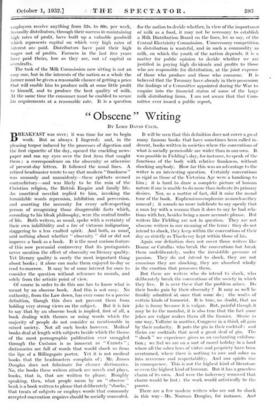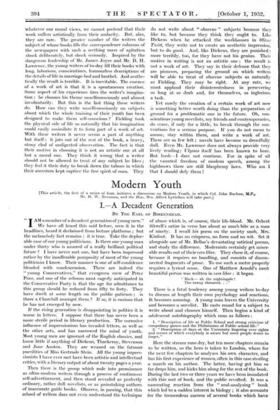" Obscene " Writing
By LORD DAVID CECIL.
BREAKFAST was over; it was time for me to begin work. But as always I lingered; and, in the pleasing torpor induced by the processes of digestion and the first cigarette. of the day, opened the crackling news- paper and ran my eyes over the first item that caught them ; a correspondence on the obscenity or otherwise of present-day letters. It followed the usual. lines. A retired headmaster wrote to say that modern " frankness " was unmanly and unmaidenly—these epithets seemed contradictory—and was likely to be the ruin of the Christian religion, the British Empire and family life, An unretired novelist replied to him, invoking the formidable words repression, inhibition and perversion. and asserting the necessity for every • self-respecting person, of recognizing those disagreeable facts which, according to his bleak philosophy, were the central truths of life. Both writers, as usual, spoke with a certainty of their own infallibility and a fire of virtuous indignation, staggering to a less exalted spirit. And both, as usual, said nothing about whether " obscenity " did or did not improve a book as a book. It is the most curious feature of this now perennial controversy that its protagonists never mention the effect of obscenity on literary quality.
Yet literary quality is surely the most important thing about books ; it alone can make them enjoyed to-day or read to-morrow. It may be of some interest for once to consider the question without reference to morals, and solely from -the artistic point of view.
Of course in order to do this one has to know what is meant by an obscene book. And this is not easy. No authority, from the Law down, has ever come to a precise definition, though this does not prevent them from holding very strong views on the subject. But it is fair to say that by an obscene book is implied, first of all, a book dealing with themes or using words which the majority of people do not consider as mentionable in mixed society. Not all such books however. Medical books deal at length with subjects beside which the theme of the most pornographic publication ever smuggled through the Customs is as innocent as " Carrots " ; dictionaries are full of words that would shock us from the lips of a, Billingsgate porter. Yet it is not medical books that the headmasters complain of ; Mr. James Douglas does not fulminate for cleaner dictionaries. No, the books these writers attack are novels and plays, books, that is, that are written to please. Roughly speaking, then, what people mean • by an " obscene " book is a book written to please that-deliberately "shocks," that treats of subjects or employs words that commonly accepted 'convention requires should be socially concealed. It will be seen that this definition does not cover a great many famous books that have sometimes been called in- decent, books written in societies• where the conventions of what is socially permissible are wider than in our own. It was possible in Fielding's day, for instance, to speak of the functions of the body with relative frankness, without shocking anybody. How far this was an advantage to the writer is an interesting question. Certainly conventions as rigid as those of the Victorian Age were a handicap to him ; it is hard to draw a complete picture of human nature if one is unable to do more than indicate its primary desires. Nor, as a matter of fact, did it raise the moral tone of the book. Euphemisms emphasize as much as they conceal ; it sounds no more indelicate to say openly that a man lay with a woman than it does to say he had rela- tions with her, besides being a more accurate phrase. But writers like Fielding are not in question. - They arc not obscene writers in our meaning of the term : they do not intend to shock, they keep within the conventions of their day as strictly as Thackeray kept within those of his.
Again our definition does not cover those writers like Donne or Catullus who break the conventions but break them undeliberately, under the irresistible pressure of passion. They do not intend to shock, they arc not conscious they are shocking, they are absorbed wholly in the emotion that possesses them.
But there are writers who do intend to shock, who deliberately break the conventions of the society in which they live. It is over these • that the problem arises. Do their books gain by their obscenity ? It may as well be frankly admitted at once that some do ; the works of certain kinds of humorist. It is true, no doubt, that no joke is funny because it is vulgar. But, painful though it may be to the moralist, it is also true that the fact sonic jokes are vulgar makes them all the funnier. Sterne in one way, Voltaire in another, Congreve in a third, all gain by their audacity. It puts the gin in their cocktail : and theirs are cocktails that need a great deal of gin. The " shock" we experience gives us an enchanting exhilara- tion ; we feel we are on a sort of moral holiday in a land where all the sober laws of virtue and propriety have been overturned, where there is nothing to awe and sober us into reverence and respectability. And our spirits rise in consequence. • This is not the highest kind of literature or even the highest kind of-humour.. But it has a graceless charm of its own. And were the indecency removed that charm would be lost : the work would artistically be the poorer.
There are a few modern writers who are out to shock in this way—Mr. Norman Douglas, for instance. And whatever our moral views, we cannot pretend that their work suffers artistically from their audacity. But, alas, they are rare. The greater number of the writers the subject of whose books fills the correspondence columns of the newspapers with such a seething mass of agitation shock deliberately, but shock seriously. Inspired by the dangerous leadership of Mr. James Joyce and Mr: D. H. Lawrence, the young writers of to-day fill their books with long, laborious, conscientious, humourless descriptions of the details of life in marriage-bed and brothel: And aesthe- tically the result is terrible. It is inevitable. The essence of a work of art is that it is a spontaneous creation: Some aspect of his experience fires the writer's imagina- tion : he chooses his theme unselfconsciously and almost involuntarily. But this is the last thing these writers do. How can they write unselfconsciously on subjects about which the whole training of their youth has been designed to make them self-conscious ? Fielding took the physical side of life so naturally that his imagination could easily assimilate it to form part of a work of art. With these writers it never seems a part of anything but itself ; it juts out of the rest of the book, a heavy; stony clod of undigested observation. The fact is that their motive in choosing it is not an artistic one at all but a moral one. They think it wrong that a writer should not be allowed to treat of any subject he likes ; they feel it their duty to break down the taboos in which their ancestors kept captive the free spirit of man. They do not *rite about " obscene " subjects because they like to, but because they think they ought to. Like Dickens when he attacked the workhouses in Oliver Twist, they write not to create an aesthetic impression, but to do good. And, like Dickens, they are punished ; more terribly, too, for they have not his genius. Their motive in writing is not an artistic one ; the result is not a work of art. They say in their defence that they are pioneers, preparing the ground- On which writers will be able to treat of obscene subjects as -naturally as Fielding. They may be right. At any rate, we must applaud their disinterestedness in persevering so long at so drab and, for themselves, -so inglorious a task.
Yet surely the creation of a certain work of art- now is something better worth doing than the preparation of ground fora problematic one in the future. Oh, con- scientious young-novelists, my friends and contemporaries, do cease, if only for a little, to break through the con- ventions for a serious purpose. If you do not mean to amuse, stay within them, and write a work of art. There are so few left ; novels have become so dreadfully dull. Even Mr. Lawrence does not always provide very lively reading; Ulysses itself has been known to bore. But hush—I dare not continue. For : in spite. of all the vaunted freedom of modern speech, among the highbrows there are still blasphemy laws. Who am I that I should defy them I















































 Previous page
Previous page